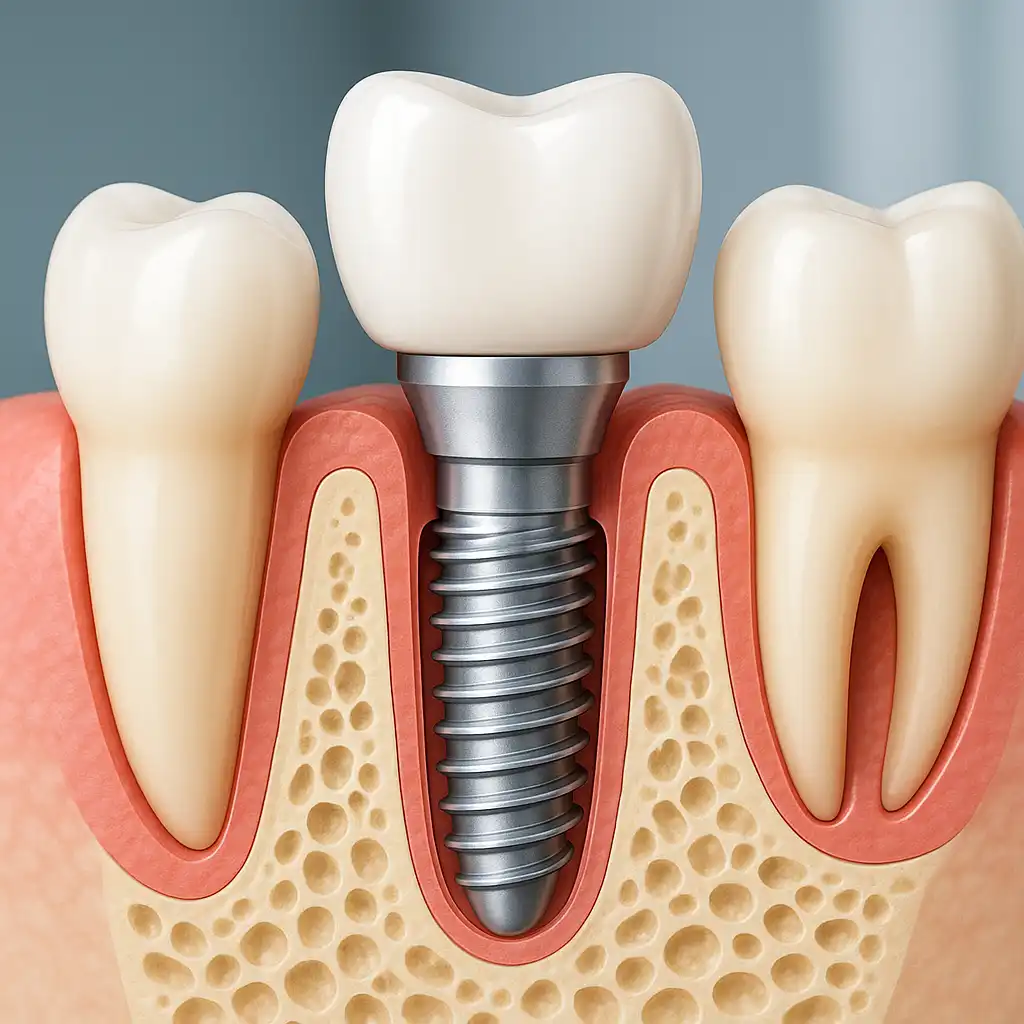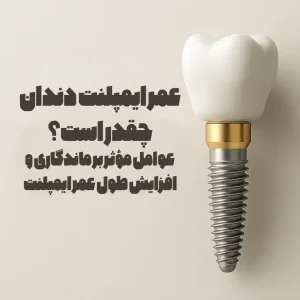Introduction
Deciding to get dental implants is one of the most important choices you will make in your life regarding your oral health. The question, “Are implants right for me?” is on many people’s minds, and the answer depends on a variety of medical, physical, and even lifestyle factors.
In this comprehensive guide, we review all the important criteria for determining dental implant candidacy so you can make an informed decision.
For more information about dental implant aftercare, see our specialized article.
Who are good candidates for dental implants?
General candidacy requirements:
The right age for implants
- Minimum age: 18 years (complete development of facial bones)
- Maximum age: There is no specific age limit.
- Elderly: With careful evaluation, implants are also suitable for the elderly.
- Teenagers: must wait until they are fully grown.
General health status
Suitable candidates must meet the following requirements:
- Good general health
- Absence of uncontrolled serious illnesses
- Healthy immune system
- Decent healing power
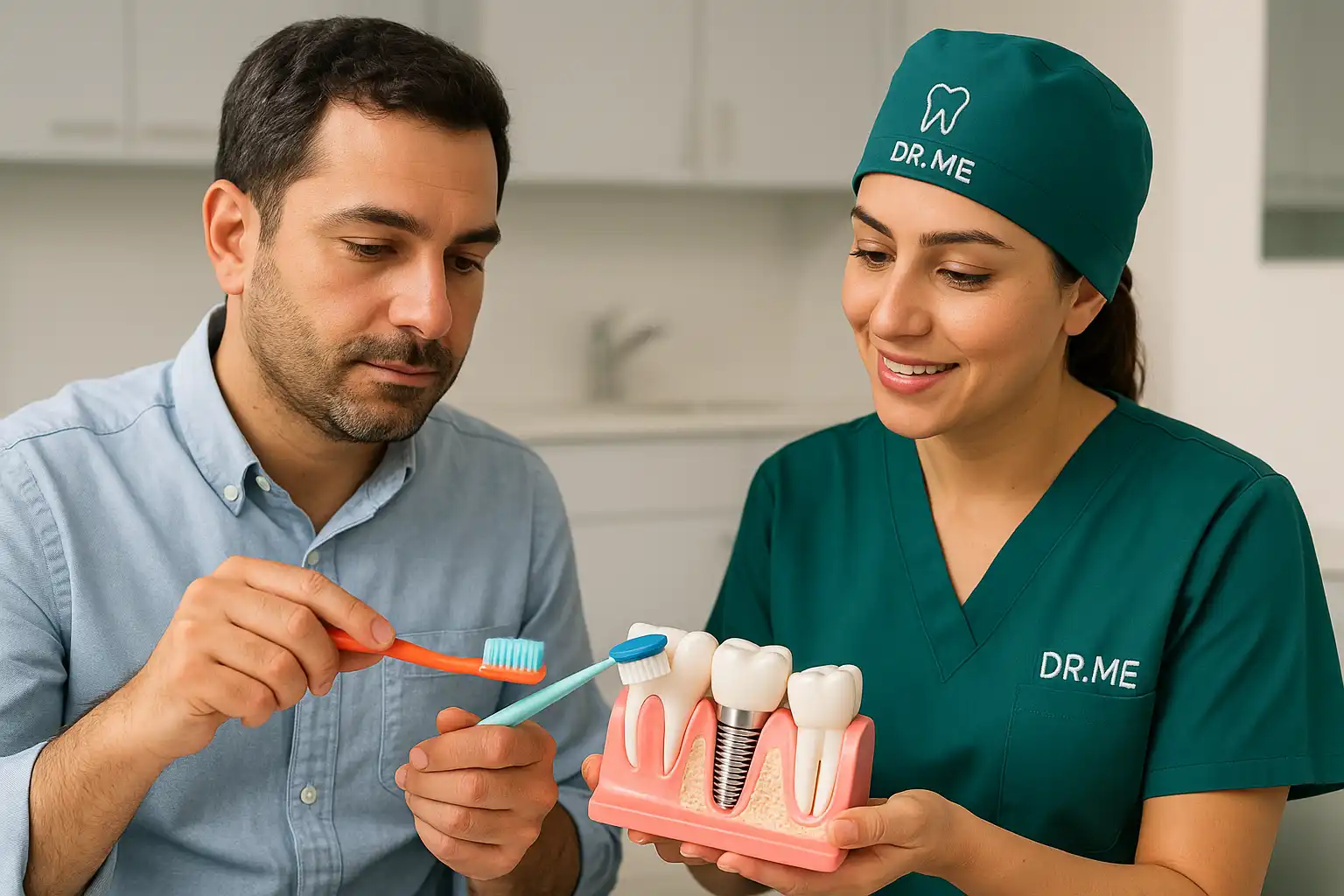
Checking the condition of the mouth and teeth
Jawbone quality and quantity
Sufficient bone to support the implant:
- Bone height: at least 8-10 mm
- Bone width: at least 6 mm
- Bone quality: suitable density for osseointegration
- Distance from sinus: In the upper jaw, at least 2 mm.
Solutions for bone deficiency:
- Bone Grafting
- Sinus Lift
- Bone regeneration techniques
- Short or narrow implants
Gum and soft tissue condition
Gum health criteria:
- No severe gingivitis
- Periodontal disease control
- Appropriate thickness of gum tissue
- Good oral hygiene
Condition of adjacent teeth
Favorable conditions:
- Healthy teeth next to the implant site
- Sufficient distance from adjacent teeth
- Absence of infection
- Proper alignment of the gum line
Diseases and medical conditions affecting implants
Diseases that do not prevent implants (with control):
Diabetes
- Controlled diabetes: Implants are possible with HbA1c below 7%.
- Special care: blood sugar control before and after surgery
- Slower recovery: Need for more patience in the recovery process
- Further reading: More rigorous controls are necessary
Blood pressure
- Controlled blood pressure: not a contraindication for implants
- Medication adjustment: coordination with the cardiologist
- Stress Management: Managing Anxiety During Surgery
Heart diseases
- Under the supervision of a cardiologist: essential
- Antibiotic prophylaxis: necessary in some cases
- Monitoring during surgery: checking vital signs
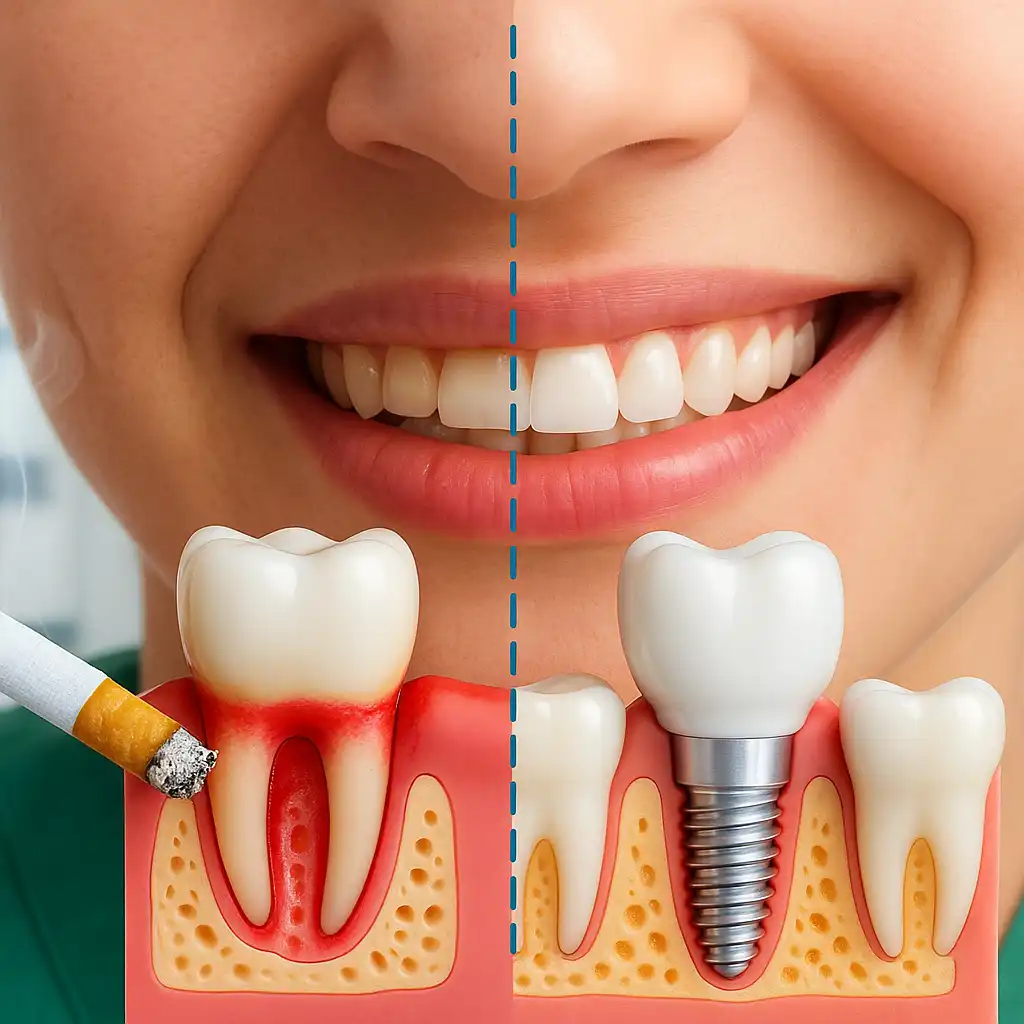
Problematic conditions:
Bleeding disorders
- Use of anticoagulants: need for temporary cessation (with the advice of a doctor)
- Hemophilia: Need for special care
- Platelet disorders: careful evaluation is necessary.
Skeletal diseases
- Osteoporosis: Reduced implant success
- Arthritis: May affect recovery
- Bisphosphonate use: risk of jaw necrosis
Absolute contraindications to implants:
- Active cancers (especially in the head and neck area)
- Recent radiation therapy to the jaw area
- Severe immune system disorders
- Active drug or alcohol addiction
- Uncontrolled mental illness
Effective habits and lifestyle
Smoking
Negative effects of smoking:
- 50% reduction in implant success
- Slower and more problematic recovery
- Increased risk of infection
- Problem with osseointegration
Recommendations for smokers:
- Quit smoking 2 weeks before surgery.
- Do not use for 8 weeks after surgery.
- Considering alternative methods
Oral hygiene
Necessary criteria:
- Brushing your teeth regularly (at least twice a day)
- Using dental floss
- Regular visits to the dentist
- Plaque and dirt control
Pre-implant evaluations
Clinical examinations
Clinical examination
- Complete oral and dental examination
- Bite and jaw assessment
- Examination of soft tissues
- Measuring the distance between teeth
Specialized advice
- Discussing expectations
- Explanation of the treatment process
- Explore alternatives
- Financial planning
Diagnostic imaging
Panoramic radiography
- General examination of the jawbone
- Identifying vital structures
- Checking adjacent teeth
CBCT (Cone-beam CT scan)
- Accurate 3D imaging
- Accurate bone measurement
- Identifying nerves and sinuses
- Guided surgical planning
Paraclinical tests
Blood tests:
- CBC (Complete Blood Count)
- Fasting blood sugar
- Blood clotting time
- In special cases: more specialized tests
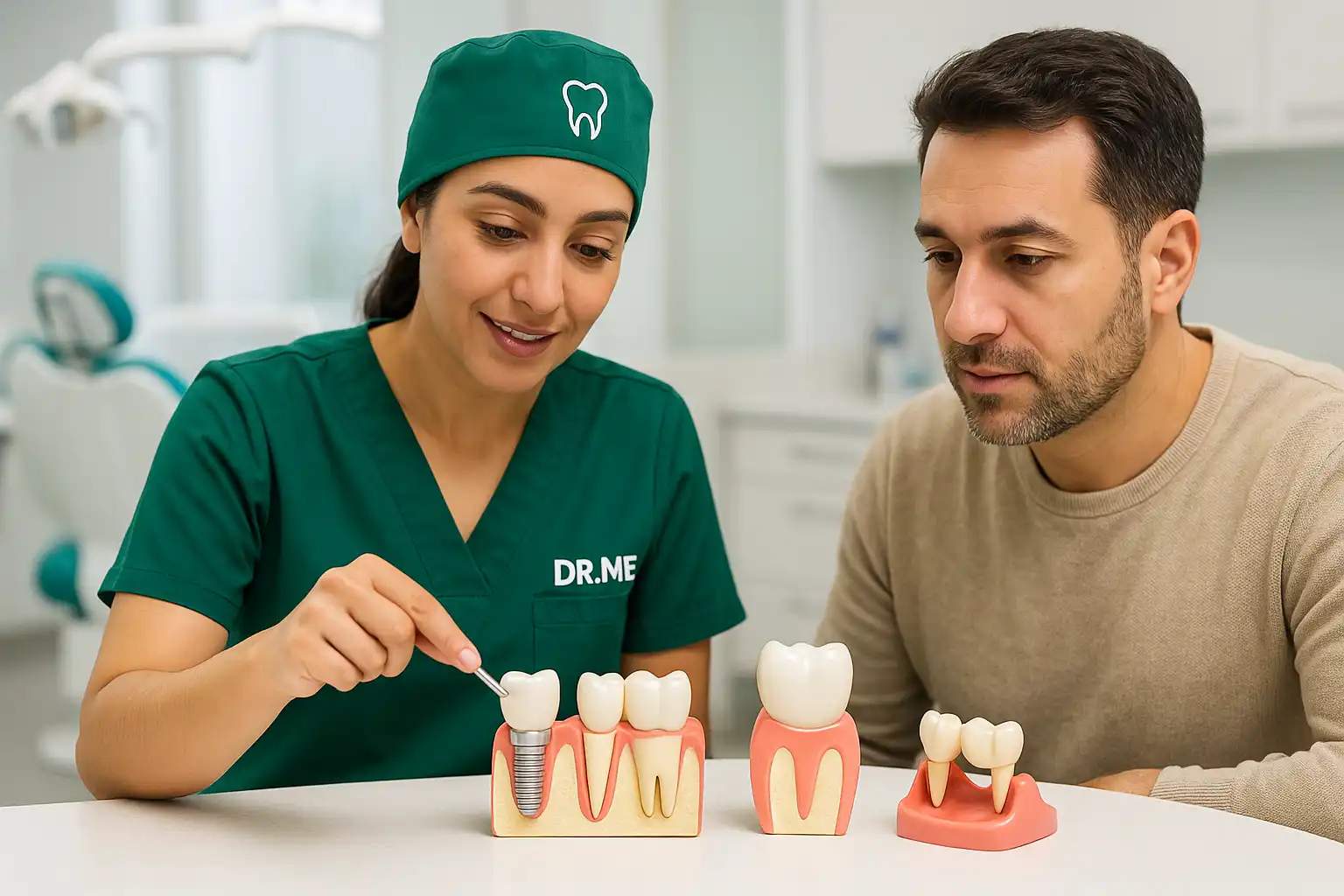
Implant alternatives
For unsuitable people:
Fixed bridge (Bridge)
- Suitable for: Missing 1-3 consecutive teeth
- Advantages: Faster treatment, lower cost
- Disadvantages: Requires wear of adjacent teeth
Partial or complete prosthesis
- Suitable for: Multiple missing teeth
- Advantages: Low cost, non-surgical
- Disadvantages: Less comfortable, needs periodic replacement
Mini Implants
- Suitable for: Special cases with bone limitations
- Advantages: Less invasive surgery
- Disadvantages: Less strength
Key questions for self-assessment
Personal checklist:
Age and general health:
- Am I over 18 years old?
- Is my general health good?
- Do I have a specific disease that is not under control?
Mouth condition:
- Is my oral hygiene good?
- Do I have gingivitis or periodontal disease?
- Do I visit the dentist regularly?
Lifestyle:
- Do I smoke? (If so, am I willing to quit?)
- Will I be able to follow the post-surgery care?
- Do I have realistic expectations of the outcome?
Financial conditions:
- Do I have the financial ability to pay for treatment?
- Am I ready for long-term treatment?
Consultation with a specialist
Choosing the right dentist
Important features:
- Specializing in dental implants
- Successful track record and sufficient experience
- Use of modern equipment
- Providing comprehensive advice
Important questions to ask:
- Am I a good candidate for implants?
- What tests do I need?
- How long does it take?
- What is the total cost of treatment?
- What warranty do you offer on implants?
- What happens if it fails?
Special cases and exceptions
Pregnant women
- No surgery during pregnancy
- Waiting until breastfeeding is over
- Hormonal changes affecting recovery
Children and adolescents
- Waiting for growth to complete
- Using temporary solutions
- Periodic growth review
Professional athletes
- Surgical scheduling management
- Protecting the implant site
- Planning a return to sports
Expected results from implants
Success rate
- Under suitable conditions: 95-98%
- In complex cases: 85-90%
- Influencing factors: age, health, hygiene, bone type
Long-term benefits
- High durability: up to 25 years and more
- Natural function: like real teeth
- Bone preservation: preventing resorption
- Natural beauty: complete tooth simulation
Final decision-making
Important factors in decision making:
Prioritizing needs
- Is performance more important or beauty?
- How important is long-term durability?
- Is ease of use important?
Explore options
- Comparing implants with other methods
- Cost-benefit assessment
- Considering personal circumstances
Consulting with family
- Discussion with relatives
- Taking into account opinions
- Support during treatment
Conclusion
Determining if implants are right for you It requires a comprehensive assessment of various medical, physical, psychological, and financial factors. Although dental implants are an excellent option for most people, the final decision should be made after careful consultation with a dental professional.
The most important point It is important to honestly assess your situation and speak openly with your dentist. Only in this way can you make the best decision for the health and beauty of your teeth.
For specialized advice and consideration of dental implant candidacy, contact Dr. Maryam Ebrahimi’s Dental Clinic in Heravi Square, Tehran.
After deciding on implants, be sure to read the dental implant aftercare guide to be prepared for the next steps.

